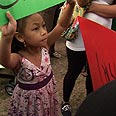
Foreign workers' kids. Linked to their countries by cultural and familial ties
צילום: רועי גזית
Colombia isn’t Auschwitz
Op-ed: Expelled foreign kids aren’t sent to death camps, but merely to poorer countries
In recent days, we’ve seen escalating protest against the government’s decision to expel foreign workers and their families staying in Israel illegally. The offensive language and distortion of facts on the part of groups active on the foreign workers front are dubious as it is, yet now we see new lows being reached with Holocaust comparisons being thrown into the mix.
It started with Minister Binyamin Ben-Eliezer, who slammed the decision made by the government (which he continues to be a member of,) noting that “this isn’t the Jewish state I know.” When Nobel Prize laureate (and Shoah survivor) Elie Wiesel condemned the decision too, wondering how the Jewish state can bear to expel children, the hint became clearer.
Finally, we saw a letter issued by the Holocaust survivors’ organization, referring to the decision as a case of “selection” (the term used at Nazi camps to decide who would live and who would die.)
All of the abovementioned people are making the same comparison: A Jewish state that expels the families of foreign workers reminds them of the Holocaust. These people would do well to refresh their memories a little before enlisting the Shoah to their cause.
It is the right and even duty of individuals and organizations to protest government decisions if they believe these are flawed. However, bringing the Holocaust into a debate that has nothing to do with the Shoah is not only repulsive in and of itself, but also encourages further cheapening of the Holocaust and dishonors the memory of the Nazis’ victims.
The current struggle is not about the fate of war zone refugees or ones who arrived from totalitarian states, and we aren’t dealing with homeless or family-less children or ones deprived of human rights. Rather, only one issue is at hand here - standard of living.
Sent into unknown?
Thousands of foreign workers who arrived in Israel on work permits overstayed their welcome years after the permits expired; during this time, some of them bore children. Just like any illegal alien or tourist whose visa expired, they must return to their countries. Yet these people and their children are certainly not heading back to hunger or suffering, to a war zone or a murderous regime, and surely not to the ovens of Auschwitz.
Each and every one of these foreign workers could have claimed refugee status or argued that they face danger at their home country, yet they are not saying this. After all, the states they are bound to return to – such as Colombia, the Philippines, and Ghana – are free democracies boasting stable economies. Moreover, these people are linked to their countries by cultural and familial ties.
When these foreign workers return to their homelands they will not be among the wealthy, but also not among the poorest. After all, working in Israel for years, without paying taxes, enabled them to accumulate the kind of wealth that would afford them a reasonable social and economic status in their home countries.
The apparent problem only has to do with their children, with the argument being that having been born in Israel and growing up here until the age of four or five (the government decided not to expel those who already entered the education system,) they will be cut off from everything they know and be sent into the unknown.
However, this unknown is the Philippines or Colombia, their country of citizenship and the home of their families and parents’ culture. Is it appropriate to liken the fate of such children to that of the Jewish refugees in Europe in the Second World War or of current-day refugees in Darfur and Kirgizstan? Is it proper to use terms like “selection” in this context?
Do we have to understand from the words uttered by Ben-Eliezer, Wiesel, and the Shoah survivors’ organization that there is any similarity between the fate of a child who flies to Colombia with his family and the Jews expelled to ghettos and extermination camps? The answer is clear: Colombia isn’t Auschwitz.
Ofir Haivry is an Associate Fellow at the Shalem Center’s Department of Philosophy, Political Theory and Religion
- Follow Ynetnews on Facebook










